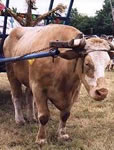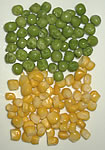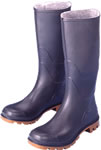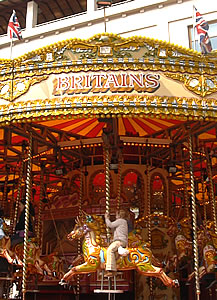|
|
Study, work or travel in the UK. British
culture and life.
|
|
|
|
|
|
|
|
|
|
|
|
|
|
|
|
|
|
|
|
|
|
|
|
|
|
|
|
|
|
|
|
|
|
|
|
|
Fun with poems, rhymes and words
|
INTRODUCTION
Fun for people who are studying English, who like playing with the
English language.
|
Products related to word play:
|
|
|
Back to top
| |
Sounds and Letters
A poem for English students
|
|
|
When in English class we speak,
Why is break nor rhymed with freak?
Will you tell me why it's true
That we say sew, but also few?
When a poet writes a verse
Why is horse not rhymed with worse?
Beard sounds not the same as heard
Lord sounds not the same as word
Cow is cow, but low is low
Shoe is never rhymed with toe.
Think of nose and dose and lose
Think of goose, but then of choose.
Confuse not comb with tomb or bomb,
Doll with roll, or home with some.
We have blood and food and good.
Mould is not pronounced like could.
There's pay and say, but paid and said.
"I will read", but "I have read".
Why say done, but gone and lone -
Is there any reason known?
To summarise, it seems to me
Sounds and letters disagree.
|
PLURALS
| |
Double Trouble
A poem for English students
by Mark Chandler
|

Fox |

Ox |
Please spare me a thought
For the cause of my frowns
My teacher's just taught
Me the plurals of nouns
|
|
So let's start with a fox
Well, the plural is foxes
But change it to ox
We have oxen, not "oxes"
|

Man |

Peas & corn |
He becomes they:
Man becomes men
So I think I can say
Humans are "humen"!
|
|
Explain to me please:
On my plate are pink prawns
The green things are peas
Make the yellow ones "corns"!
|

Boots |

Trousers |
So foot becomes feet?
There's no logic at all ...
Because boots are not "beet"
... And you say 'six foot tall'
|
|
A pair of trousers - OK?
But I see only one.
Can you please say
Where the other has gone?
|
Notes
- A "frown" is an expression on your face which shows that you are
annoyed or worried
- In the UK we may have "peas and corn" as vegetables with a meal
(corn means loose sweetcorn, or maize)
- A "foot" can be either a part of the body or a measurement (about
30 cm).
- People in Britain often say their heights using feet and inches, but always
say "foot" not "feet"
TONGUE TWISTERS
Try reading out these short poems. Easy? Then try to say them more quickly
...
A flea and a fly flew up in a flue.
Said the flea, "Let us fly!"
Said the fly, "Let us flee!"
So they flew through a flaw in the flue.
Which wristwatches are Swiss wristwatches?
A noisy noise annoys an oyster
Ned Nott was shot and Sam Shott was not.
So it is better to be Shott than Nott.
Some say Nott was not shot.
But Shott says he shot Nott.
Either the shot Shott shot at Nott was not shot, or Nott was shot.
If the shot Shott shot shot Nott, Nott was shot.
But if the shot Shott shot shot Shott, then Shott was shot, not Nott.
However, the shot Shott shot shot not Shott - but Nott.
Thieves seize skis.
A bloke's back bike brake-block broke.
Once upon a barren moor
There dwelt a bear, also a boar.
The bear could not bear the boar.
The boar thought the bear a bore.
At last the bear could bear no more
Of that boar that bored him on the moor,
And so one morn he bored the boar -
That boar will bore the bear no more.
Betty Botter had some butter,
"But", she said, "this butter's bitter.
If I bake this bitter butter
it would make my batter bitter.
But a bit of better butter -
that would make my batter better".
So she bought a bit of butter
(better than her bitter butter),
and she baked it in her batter,
and the batter was not bitter.
So 'twas better Betty Botter
bought a bit of better butter.
She sells sea shells by the seashore.
The shells she sells are surely seashells.
So if she sells shells on the seashore,
I'm sure she sells seashore shells.
Back to top
FUNNY MISTAKES
These are mistakes in English seen on signs in other countries. If you don't understand
why they are funny, ask a native English speaker to explain!
Hotels
Hungary (hotel): "This lift is being fixed for the next day. During that
time we regret that you will be unbearable"
France (hotel): "Please leave your values at the front desk"
Japan (hotel): "You are invited to take advantage of the chambermaid"
Norway (hotel lounge): "Ladies are requested not to have children in the
bar"
Shops
Hong Kong (tailor's shop): "Ladies may have a fit upstairs"
Greece (tailor's shop): "Because is big rush we will execute customers in
strict rotation"
France (dress shop): "Dresses for street walking"
Italy (laundry): "Ladies, leave your clothes here and spend the afternoon
having a good time"
Tourism
France (railway): "Obliteration on the train"
Czech Republic (tourist office): "Take one of our horse-drawn tours - we
guarantee no miscarriages"
Restaurants
Switzerland (restaurant): "Our wines leave you nothing to hope for"
Mexico (hotel restaurant): "The manager has personally passed all the water
served here"
Doctors
Italy (doctor's surgery): "Specialist in women and other diseases"
Hong Kong (dentist's surgery): "Teeth extracted by the latest Methodists"
But it isn't only non-native English speakers who write strange things.
Here is a list of some label instructions on consumer goods in the UK or America:
On a bag of crisps: "You could be a winner! No purchase necessary. Details
inside"
On a frozen dinner: "Serving suggestion: Defrost"
On a tiramisu pudding (printed on bottom): "Do not turn upside down"
On a bread pudding: "Product will be hot after heating."
On an iron: "Do not iron clothes on body."
On a cough medicine for children: "Do not drive a car or operate machinery
after taking this medication"
On a packet of sleeping pills: "Warning: May cause drowsiness"
On a packet of peanuts: "Warning: contains nuts"
On a child's superman costume: "Wearing of this garment does not enable you
to fly"
Back to top
ANAGRAMS
You make an anagram by putting the letters of a word, name or phrase
in a different order to spell a different word or phrase. For example, EAT and
ATE are both anagrams of the word TEA. Try to make an anagram of your own name,
or a friend's (for example, an anagram of my name - Mark David Chandler - is
Dark Charm, and Devil!)
Anagrams are more interesting if they are appropriate for the original word
or phrase (or person) in some way, or are funny. Here are some examples:
Old England : Golden land
The Encyclopaedia Britannica : A dictionary can be elephantic
HMS Pinafore : Name for ship
Yorkshire pudding : Hungry? Risk odd pie
Schoolmaster : The classroom
Dormitory : Dirty room
Punishment : Nine thumps
Eleven plus two : Twelve plus one
A decimal point : I'm a dot in place
Angered : Enraged
Postponed : Stopped? No
The eyes : They see
This ear : It hears
Eskimos : Some ski
Italian : a Latin, I
The nudist colony : No untidy clothes
The countryside : No city dust here
Train : It ran
Tennis : In nets
Minutes : Sun time
Astronomer : Moon-starer
Postman : No stamp?
Marriage : A grim era
Mother-in-law : Woman Hitler
Women : Won me
For a wide range of anagrams connected with the UK, see: http://www.anagramgenius.com/archive/uk.html
If you want help finding anagrams, there are several websites which will suggest
anagrams for you. For example:
http://freespace.virgin.net/martin.mamo/anagram.html
Back to top
COCKNEY RHYMING SLANG
A Cockney is a person from a traditional working class area of east London. A
way of speaking developed here known as "Cockney rhyming slang". A word
is replaced by a phrase or a person's name which rhymes with it. For example,
instead of saying "I don't believe it" a Cockney person might
say "I don't Adam and Eve it". To make it harder, it is common
for the second half of the phrase to be left out, however (for example "I
don't Adam it").
This way of speaking is still used by some people who grew up in this area of
London when talking to each other. An office worker in London recently sent an
e-mail to some friends boasting about a sexual experience, which has become a
very famous e-mail because it was copied to thousands of people all over the world
(and was also printed in some newspapers). This e-mail contained some examples
of Cockney rhyming slang. He talked about "sitting in front of the telly
watching football, having a Ruby and a couple of beers". Ruby Murray
was a famous singer from Northern Ireland who made a lot of hit songs in the 1950s
(although most young people haven't heard of her). The logic is Ruby => Ruby
Murray => curry, so "having a Ruby" means eating a curry. He also
wrote that his girlfriend was "chatting to me on the dog". The
logic is dog => dog and bone => phone, so "chatting on the dog"
means talking on the telephone.
Here are some of the most commonly known examples of Cockney Rhyming Slang:
"Let's have a butcher's" means "let's have a look"
(butcher's => butcher's hook => look)
"Have you been telling porkies?" means "have you been telling
lies?" (porkies => pork pies => lies)
"She has been rabbiting on for ages" means "she has been
talking for ages" (rabbit => rabbit and pork => talk)
"I went home to the trouble" means "I went home to my wife"
(trouble => trouble and strife => wife)
Confused? Well, to make it even more confusing, Cockney Rhyming Slang changes
as new people or phrases become famous. You can find a dictionary of Cockney Rhyming
Slang at the site: http://www.cockneyrhymingslang.co.uk.
Try using the "Cockney translator" on the site to change simple English
into Cockney slang. If you tell a friend about the site, you can try having an
e-mail or Messenger conversation with that person using the translated versions.
See if you can try to understand what your friend is saying, or just enjoy the
sound of the language you create. Warning: if you try speaking like this to an
English person, you will get some strange looks, and your English teacher may
get a bit depressed!
If you like this you may want to try: http://www.whoohoo.co.uk.
As well as Cockney, this will translate something into the following dialects:
"Brummie" (Birmingham), "Scouse" (Liverpool), "Geordie"
(Newcastle), "Scottie" (Scotland), "Jolly well spoken" (a
'posh' person), "Irish", and "Ali G" (the style of a well-known
comedian). A good way to start a conversation with someone from one of these parts
of the UK is to ask them to explain some of their local expressions: often, the
person will love to teach you some phrases for you to practice!
Back to top
LINKS
British poetry: English/Reading/Poetry
Study English: English
Lyrics of British pop songs: Britain/Music/Lyrics
Home page: Home
Back to top
© UK Student Life 2002-2009
* Search this website (www.ukstudentlife.com) or the web:











